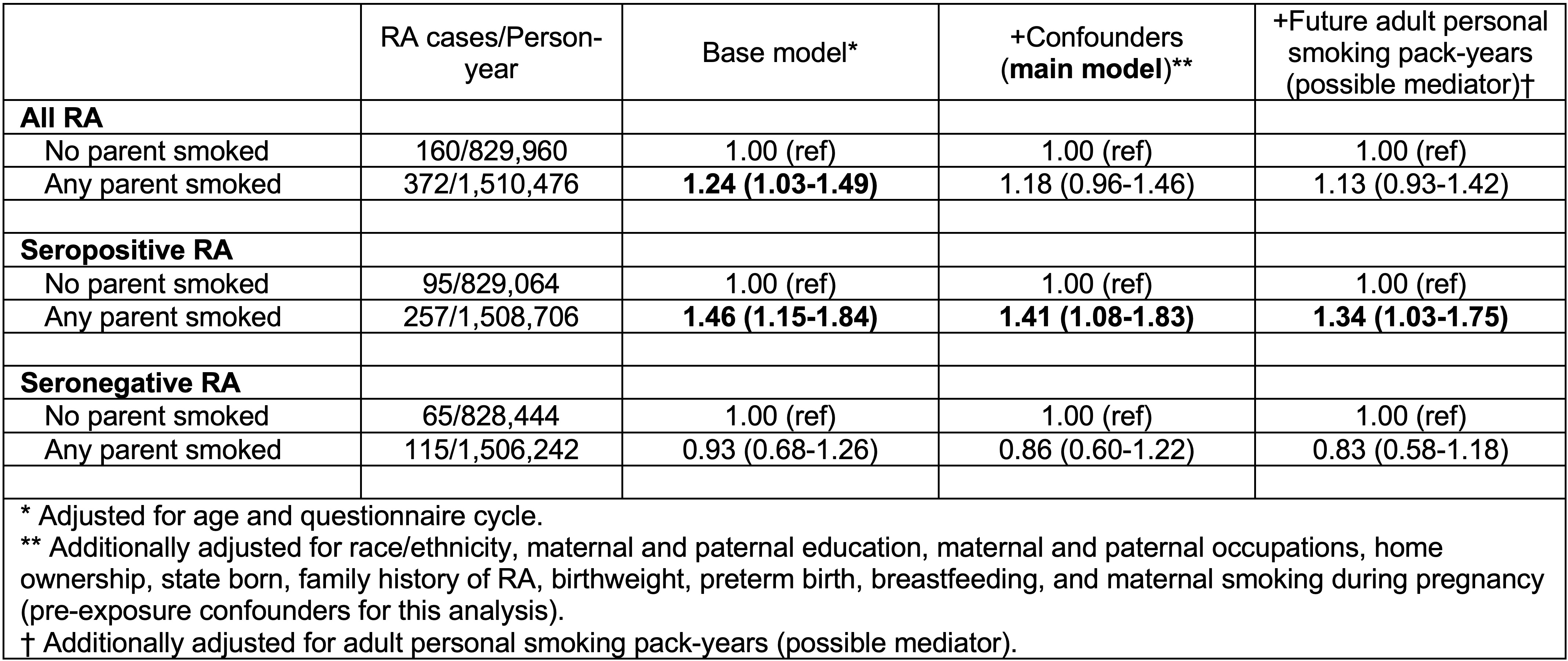Session Information
Date: Sunday, November 8, 2020
Title: Epidemiology & Public Health Poster III: Inflammatory Rheumatic Disease
Session Type: Poster Session C
Session Time: 9:00AM-11:00AM
Background/Purpose: Personal cigarette smoking has been strongly associated with the risk for developing seropositive RA. Previous studies concerning passive smoking conflict; some suggested that childhood passive smoking confers RA risk but not all. No studies have investigated passive smoking throughout the life course and the risk of RA, while also accounting for the possible mediation of personal smoking.
Methods: We conducted a cohort study utilizing the Nurses’ Health Study II, an ongoing prospective cohort of female registered nurses. Biennial questionnaires collected information on items such as sociodemographics, anthropometrics, dietary intake, and health conditions. Incident RA and date of diagnosis were determined by medical record review (all meeting 1987 ACR or 2010 ACR/EULAR classification criteria). Serostatus for RA was determined by positive result for RF or anti-CCP protein antibody in medical records. Three passive smoking exposures spanning the life course were assessed: maternal smoking during pregnancy (In utero exposure), parental smoking at home during childhood, and years spent living with a smoker since age 18. Covariates included early life (e.g., parental education, parental occupation, birthweight) and time-updated adult (e.g., personal smoking pack-years, dietary intake, BMI, menopause) factors. Parental smoking behavior could have influenced participants’ uptake of late adolescent and adult smoking, making the latter a possible mediator between early life passive smoking and adult-onset RA. We examined the association between each passive smoking exposure and incident RA risk using Cox regression models.
Results: Among 90,923 women (mean age at baseline 34 years), we identified 532 incident RA cases (352 seropositive; 180 seronegative) during 2,340,436 person-years of follow-up (mean 25 years/participant). In the sample, 25% had in utero exposure to maternal smoking during pregnancy; 64% reported childhood home exposure to parental smoking; and 44% reported living with a smoker as an adult (35% with ≤20 years, 9% with 20+ years). Maternal smoking during pregnancy was associated with incident RA after confounding adjustment (HR 1.25 [95% CI 1.03, 1.52]). This finding was stronger for seropositive RA (HR 1.34 [1.06, 1.70]). Childhood parental smoking was associated with seropositive incident RA after adjusting for confounders including maternal smoking during pregnancy (HR 1.41 [1.08, 1.83]). This association was present even after adjusting for a potential mediator, adult personal smoking (HR 1.34 [1.03, 1.75]). After adjustment for confounders including personal smoking, there was no association of adult passive smoking with RA (20+ years lived smoker: HR 1.02 [0.74, 1.40] vs. none).
Conclusion: In this analysis spanning the life course, early life passive smoking exposures were associated with incident seropositive RA in adulthood. Childhood parental smoking was associated with incident seropositive RA even after adjustment for adult personal smoking, suggesting an important influence of early-life inhalant exposures on adult-onset RA. The possible association of adult passive smoking with RA was completely explained by confounders including personal smoking.
 Table 1. Hazard ratios for rheumatoid arthritis, overall and by serologic phenotype, according to maternal smoking during pregnancy (in utero exposure) (n=90,923).
Table 1. Hazard ratios for rheumatoid arthritis, overall and by serologic phenotype, according to maternal smoking during pregnancy (in utero exposure) (n=90,923).
 Table 2. Hazard ratios for rheumatoid arthritis, overall and by serologic phenotype, according to childhood parental smoking at home (n=90,923).
Table 2. Hazard ratios for rheumatoid arthritis, overall and by serologic phenotype, according to childhood parental smoking at home (n=90,923).
 Table 3. Hazard ratios for rheumatoid arthritis, overall and by serologic phenotype, according to years lived with a smoker since age 18 (n=90,923).
Table 3. Hazard ratios for rheumatoid arthritis, overall and by serologic phenotype, according to years lived with a smoker since age 18 (n=90,923).
To cite this abstract in AMA style:
Yoshida K, Wang J, Malspeis S, Lu B, Prisco L, Martin L, Ford J, Costenbader K, Karlson E, Sparks J. Passive Smoking Throughout the Life Course and the Risk of Incident Rheumatoid Arthritis in Adulthood Among Women [abstract]. Arthritis Rheumatol. 2020; 72 (suppl 10). https://acrabstracts.org/abstract/passive-smoking-throughout-the-life-course-and-the-risk-of-incident-rheumatoid-arthritis-in-adulthood-among-women/. Accessed .« Back to ACR Convergence 2020
ACR Meeting Abstracts - https://acrabstracts.org/abstract/passive-smoking-throughout-the-life-course-and-the-risk-of-incident-rheumatoid-arthritis-in-adulthood-among-women/
